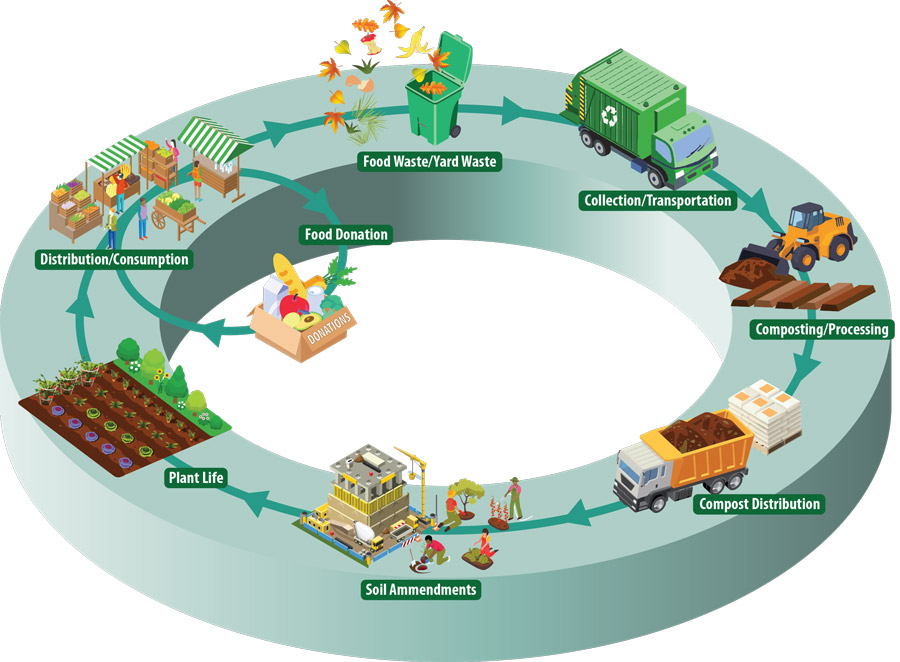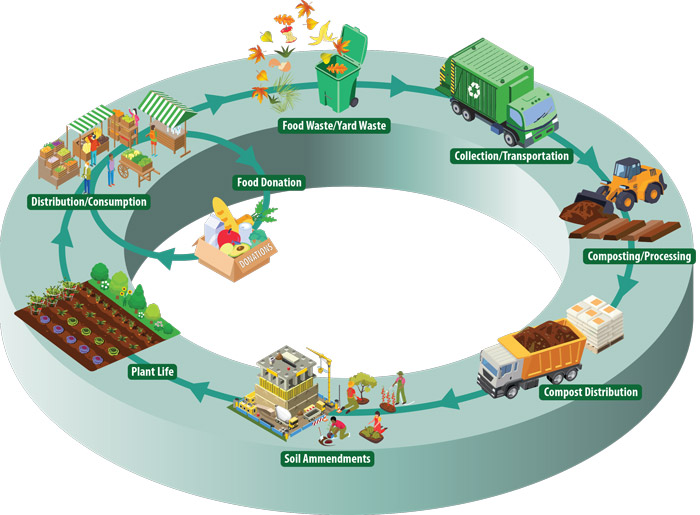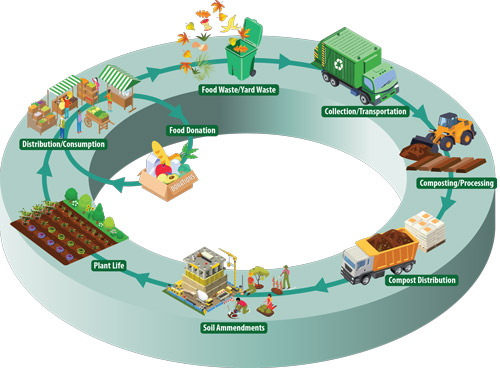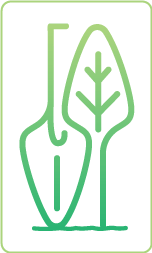Organics
Click on each stage of the compost lifecycle below to learn more:

Click on each stage of the compost lifecycle below to learn more:

Click on each stage of the compost lifecycle below to learn more:

King County has a Zero Waste of Resources by 2030 goal referenced in King County Code (KCC 10.14.020), the Strategic Climate Action Plan, and 2019 Comprehensive Solid Waste Management Plan. Recovering organic material is an essential part of reaching this goal. In 2019, organic materials comprised more than 30% of what was disposed at Cedar Hills Regional Landfill. This represents a significant wasted resource that could be prevented upstream, or recovered and transformed into a new product, such as compost.
To comply with Washington Organics Management Law (HB 1799)external link , King County added a new chapter to King County Code (KCC) Title 18 in December 2022, which requires counties to adopt a compost procurement ordinance. The ordinance adds a definition of "compost," adds a requirement that county projects use compost unless certain exceptions are met, and establishes reporting requirements related to the use of compost.
Amending soil with compost has many benefits and supports a regional circular economy for organics.
- Compost grows healthy plants, reducing use of pesticides that can end up in our surface waters. It keeps soil loose, so stormwater infiltrates, and filters pollutants from runoff.
- Compost prevents soil erosion and compaction.
- Compost stimulates plant growth and health.
- Compost helps plants thrive with less frequent irrigation and survive drought.
- Compost reduces maintenance, fertilizer and pesticide expenses.
- Compost improves plant survival in low-maintenance and naturalized projects.
- Using compost is essential to achieving King County's waste recycling and environmental quality goals.
- Composting keeps organic waste out of the landfill, helping King County meet its goal of Zero waste of resources by 2030.
- Diverting waste compost reduces greenhouse gases, helping King County reach its goals outlined in its Strategic Climate Action Plan.
- To encourage the use of compost and build strong regional markets, King County's CompostWise program provides tools and resources for the procurement and application of compost to regional public agencies.
- If you are a regional public agency and want to learn more about this program, email compost@kingcounty.gov email the LinkUp program.
- King County Compost Procurement Ordinance (2022)Download PDF 200 K - Ordinance 19552, as required by the Washington Organics Management Law (HB 1799external link ). Adds a definition of "compost," adds a requirement that county projects use compost unless certain exceptions are met, and establishes reporting requirements related to the use of compost. Further, this ordinance will divert and support end markets for compost.
- Organic Materials Management Report (2019) Download PDF 1 MB
Funded by King County, research on the regional organic material stream and an organics market assessment. - King County Organics Market Development Plan Download PDF 600 K
As requested by the King County Council, the plan submitted by the Executive to expand and enhance the regional market for compost that is produced using the county's organics stream. - 2022 Organic Materials Management in King County Infographic Download PDF 150 K
Information on the how organic material is collected and process in King County. - King County Zero Waste of Resources by 2030 Goal
Achieve zero waste of resources by 2030 through maximum feasible and cost-effective prevention, reuse and reduction of solid wastes. Recovering organic material is an essential part of reaching this goal. - Carbon Accounting for Food Scrap Composting in King County, WA
Full reportDownload PDF 700 K | Executive summaryDownload PDF 125 K
The diversion of food scraps from landfill to compost is associated with a range of benefits, potentially the most significant being reduction in carbon emissions. This document provides estimates of the carbon balance associated with the King County program including potential sequestration associated with different end uses of the compost. - King County Strategic Climate Action Plan Download PDF 70 MB
Note: this is a very large file (329-pages) and may take several minutes to download, depending on connection speed
A five-year blueprint for County action to confront climate change, integrating climate change into all areas of County operations and its work in the community. The 2020 update includes supporting regional compost markets and application. - King County Comprehensive Solid Waste Management Plan (2019)
Sets strategies for managing solid waste in King County over the next six to 20 years. Recovering organic material is an essential part of reaching this plan. - King County Loop Biosolids
Manages the distribution and use of Loop®, the name for the nutrient-rich organic biosolids product created by recycling the poop in the County's wastewater.
- Washington State Law (RCW 43.19A.120) external link
Use of compost products in projects (RCW 43.19A.120) – Encourages compost procurement and use and public agencies must consider compost for public projects. - Washington State Law (RCW 43.19A.150) external link
Cities and counties required to adopt a compost procurement ordinance – Report (RCW 43.19A.150) – Updates chapter 43.19A RCW use of compost products in public projects and requires a reporting system to document compost purchases. - Washington Organic Recycling Council external link
Supports—via education, research, and advocacy—public and private efforts to reclaim, reuse, and recycle organic materials, process organic materials in an environmentally and economically sustainable manner, and promote beneficial end uses. - U.S. Composting Council external link
Advances compost manufacturing, compost utilization, and organics recycling to benefit our members, society, and the environment. - Soils for Salmon external link
Teaches to preserve and restore healthy soil in the Puget Sound region.

Recycling info
Residents and businesses:
Search What do I do with…? for local organics recycling information.
Using compost?

Visit CompostWise for tips, resources, and policies for public agencies.
Stay in touch
Have questions about the LinkUp program? Contact Andy Smith contact info for Andy Smith – Program Manager


 Translate
Translate
